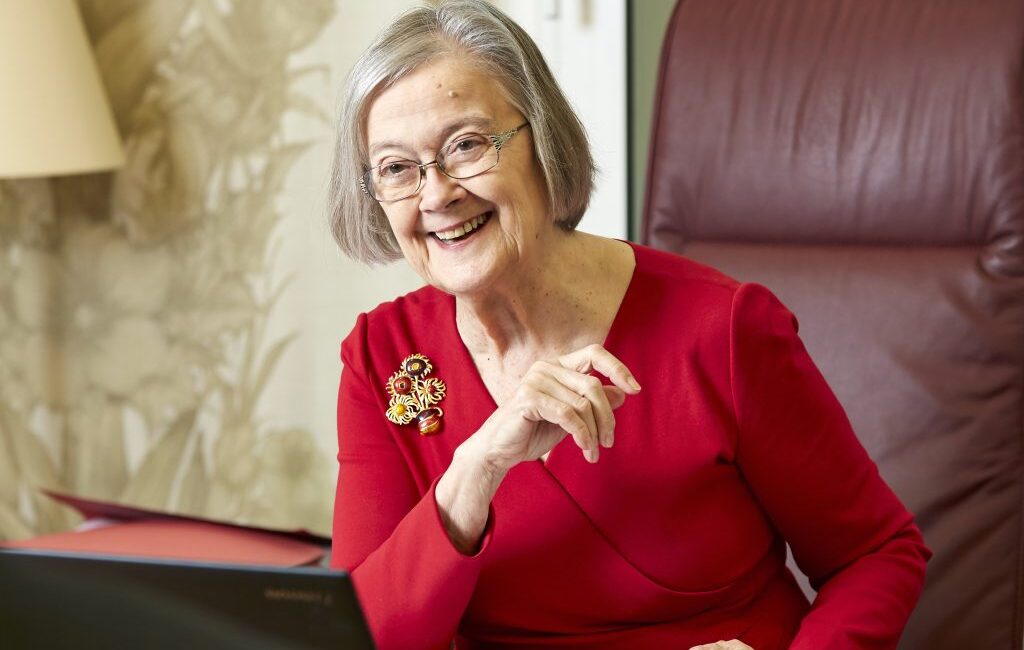On 16 March 2020, Cumberland Lodge welcomed Lady Hale, the UK’s recently retired President of the Supreme Court, and invited her to reflect on her illustrious academic and legal career in a Cumberland Conversation hosted by Chief Executive, Edmund Newell.
Due to rising concerns about the spread of COVID-19, the event was live-streamed without an audience in the room, apart from a handful of staff, and online viewers were invited to submit questions via social media rather than via the usual roaming-mic Q&A. Seats had previously long-since sold out, including overflow capacity, but in light of increased concern about the coronavirus crisis, ticketholders were refunded and invited to watch online instead.
‘Bright young things’
Lady Hale began by recounting her experience of training law students at Cumberland Lodge during popular residential courses for trainee barristers, to help them learn to become effective advocates.
Over the course of a weekend in the inspiring surroundings of Windsor Great Park, students from the Inns of Court take part in role play exercises and are trained to present submissions to court, to examine and cross-examine witnesses and to make a plea of mitigation – skills they will later need in their legal careers. These residentials have been taking place at Cumberland Lodge for many decades, since the early days of the foundation, and the income they bring helps to support the charity’s wider work.
Of these events, Lady Hale said, “There is nothing more enjoyable than helping to mould the understanding and the knowledge of bright young things”. She remarked on how students generally appreciate the brevity and clarity of her legal judgments, despite the often-complex subject matter at hand, and she likened the job of being an academic writer to the work of an appeal court judge dealing with questions of law.
Career highlights
Discussion then turned to the Constitutional Reform Act of 2005, which fundamentally altered the method of appointing judges in the UK. In place of the time-honoured ‘tap on the shoulder’ method, the Act introduced a new, independent merit-based appointing commission.
Lady Hale was appointed through both methods, during her career. She reflected on the advantages of the new system, both in terms of presenting opportunities for less conventional candidates to come forward and apply in open competition, and in dramatically reducing the influence of senior politicians over judicial appointments.
The Children Act 1989 is widely acknowledged as the UK’s most important piece of legislation for protecting children. Lady Hale played a key role in introducing this law reform, which gave primacy to the welfare of children during disputes about their upbringing, and highlighted ZH(Tanzania) as a key judgement in this regard.
Some say that the work of Baroness Hale in broadening the definition of domestic violence to encompass psychological abuse inspired a hard-hitting year-long storyline in radio programme The Archers, in 2016.
Lady Hale, herself, hailed the story as having a ‘considerable public educational effect’ in raising awareness of the problem of coercive control in relationships, and how this can manifest in subtle ways that might be largely undetectable, even to a victim’s close friends and family.
Defending the Rule of Law
In September 2019, towards the end of her tenure as President of the Supreme Court, Lady Hale delivered the Court’s unanimous judgement that Prime Minister Boris Johnson’s advice to Her Majesty The Queen to prorogue parliament had been unlawful.
Asked to comment on lessons from this famous case, Lady Hale pointed out that it served as a reminder of the limits of executive power in the UK, saying emphatically, ‘It is what the Rule of Law is all about’.
Questions from the online audience
Responding to audience questions, Lady Hale explained why she is happy to describe herself as a ‘feminist’, related her love of the law to the way it encompasses all human and commercial life, and also had some advice for today’s students of law: ‘Enjoy it, work hard, stick at it, keep an open mind, and take full advantage of all the opportunities that come your way’.
Finally, Lady Hale discussed her widely reported penchant for creature-themed brooches, explaining how these adornments had enlivened many a sober suit during her time working in the family division of the High Court. She now has a menagerie of spider, bee, dragonfly and frog brooches that will no doubt make an appearance during the academic, honorary and visiting appointments, book lectures and return trips to Cumberland Lodge that she will inevitably be making during her busy retirement.

